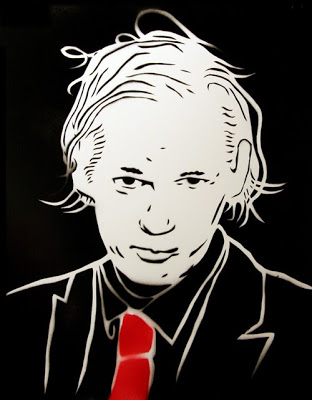
Insane Asylum?
From Center Stage to Middle Earth
Is Julian Assange crazy to want to go to Ecuador, of all the obscure places on this globe?
By James McEnteer / The Rag Blog / June 20, 2012
QUITO, Ecuador — After the UK waived the right of Julian Assange to resist extradition to Sweden, Assange took refuge in the Ecuadorean Embassy in London. He is seeking political asylum in Ecuador to avoid prosecution in Sweden and possible deportation to the United States for exposing state secrets via Wikileaks.
Western media are second-guessing Assange’s choice. Is he crazy to want to go to Ecuador, of all the obscure places on this globe? UK and U.S. officials are already putting pressure on the government of Ecuador to hand Assange over for prosecution for violating the terms of his bail. That pressure will no doubt intensify.
Assange interviewed Ecuadorean President Rafael Correa last month on his syndicated talk program with world leaders. The two men appeared cordial. After Wikileaks exposed U.S. accusations of Ecuadorean police corruption and presidential malfeasance, Ecuador expelled U.S. Ambassador Heather Hodges from the country in 2011.
The United States and Ecuador have been on touchy terms since Correa’s presidency began in 2007. Correa refused to renew the U.S. air base in Manta, on Ecuador’s Pacific coast, choosing instead to open an oil refinery there in partnership with Venezuela’s Hugo Chavez. Correa said at the time that he would be glad to let the U.S. maintain its base in Ecuador if Ecuador were allowed to open a military base in Florida. Rafael Correa is not likely to be easily intimidated.
Critics of Assange’s decision to seek asylum in Ecuador cite Rafael Correa’s crackdown on oppositional media. From the start of Correa’s term in office, media have attacked him politically and personally. He has responded with law suits, prosecutions of individuals and confiscations of media outlets, accusing his critics of colluding with the largest banks against the interests of the majority.
Correa’s censure of local media has brought him international criticism from organizations such as the Committee to Protect Journalists and the Inter American Press Association. Under intense international pressure he pardoned several high-profile journalists who had been fined and sentenced to prison. To oppose a free press would seem a vile act. But opposing a Murdoch-like press, itself a vile species, is much less so. Quoth A.J. Liebling: “Freedom of the press belongs to those who own one,” aka the 1 percent.
Critics who believe Correa’s press crackdown should give Assange pause fail to realize that both men abhor media corruption, especially the complicity of mass media with governmental and financial interests and pressures.
Changes in the new Ecuadorean constitution, written since Correa took office, have empowered the environmental movement on several fronts, on land and at sea. Assange will find Ecuador one of the greenest governments on earth. And with his popularity at a continued unprecedented high, Correa is highly likely to maintain the country’s presidency in the upcoming 2013 elections. So there would be no likely radical change of policy in the foreseeable future.
Though it’s a small country, Ecuador is ethnically and environmentally diverse, with lovely tropical coast, high volcanic Andes, and Amazon rainforest. Indigenous peoples and Afro-Ecuadorians enrich the culture. Increasing numbers of U.S. retirees are choosing to move here. So while Ecuador may seem like a “last resort” for Julian Assange, he will actually have a number of resorts — and climates — from which to choose.
Mr. Assange will also find more than adequate high-speed Internet connections available, at least in the urban areas. It’s not exactly a hardship post. And at least some of us who have chosen to live in Ecuador would be proud to have Julian Assange as a neighbor. There’s a perfectly comfortable two-bedroom apartment downstairs from us that’s currently available.
Julian, come on over!
[James McEnteer is the author of Shooting the Truth: the Rise of American Political Documentaries (Praeger 2006). He lives in Quito, Ecuador. Read more of James McEnteer’s articles on The Rag Blog.]


















The most famous of Correa’s fights with the press, the civil and criminal libel cases against El Universal, Emil Palacio et al, need to be seen in the context that the CPJ and the IAPA don’t admit: Correa was the target of a rather egregious libel, one that were it in the USA he would be able to maintain a lawsuit about notwithstanding the Sullivan Rule. The man was falsely accused of ordering soldiers to fire on a hospital, something that didn’t happen and something that the columnist and management at El Universal KNEW didn’t happen.
But down here in Latin America people who are victims of yellow journalism need to learn how to say “you asshole” rather than “you’re under arrest.”
Eric Jackson
The Panama News
Jim, I’m too far to come over, but get in touch if you can
Chris Manion CMA ’63
Front Royal VA
Yes, the press in Ecuador is in bed with the one percent. It is also worth noting that Mr. Correa has a penchant, and a talent, for insulting anyone who disagrees with him. He considers, however, any insult directed at him to be illegal, and any judge that dared to defy him would not be a judge for long.